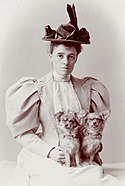Edith Wharton Quote
Something he knew he had missed: the flower of life. But he thought of it now as a thing so unattainable and improbable that to have repined would have been like despairing because one had not drawn the first prize in a lottery. There were a hundred million tickets in his lottery, and there was only one prize; the chances had been too decidedly against him. When he thought of Ellen Olenska it was abstractly, serenely, as one might think of some imaginary beloved in a book or a picture: she had become the composite vision of all that he had missed. That vision, faint and tenuous as it was, had kept him from thinking of other women. He had been what was called a faithful husband; and when May had suddenly died—carried off by the infectious pneumonia through which she had nursed their youngest child—he had honestly mourned her. Their long years together had shown him that it did not so much matter if marriage was a dull duty, as long as it kept the dignity of a duty: lapsing from that, it became a mere battle of ugly appetites. Looking about him, he honoured his own past, and mourned for it. After all, there was good in the old ways.
Something he knew he had missed: the flower of life. But he thought of it now as a thing so unattainable and improbable that to have repined would have been like despairing because one had not drawn the first prize in a lottery. There were a hundred million tickets in his lottery, and there was only one prize; the chances had been too decidedly against him. When he thought of Ellen Olenska it was abstractly, serenely, as one might think of some imaginary beloved in a book or a picture: she had become the composite vision of all that he had missed. That vision, faint and tenuous as it was, had kept him from thinking of other women. He had been what was called a faithful husband; and when May had suddenly died—carried off by the infectious pneumonia through which she had nursed their youngest child—he had honestly mourned her. Their long years together had shown him that it did not so much matter if marriage was a dull duty, as long as it kept the dignity of a duty: lapsing from that, it became a mere battle of ugly appetites. Looking about him, he honoured his own past, and mourned for it. After all, there was good in the old ways.
Related Quotes
About Edith Wharton
